Last Updated on June 3, 2025
Markdown is a plain text formatting syntax created by John Gruber in 2004. It’s designed to be easy-to-read and easy-to-write.
Readability is at the very heart of Markdown. It offers the advantages of plain text, provides a convenient format for writing for the web, but it’s not intended to be a replacement for HTML. Markdown is a writing format, not a publishing format. You control the display of the document; formatting words as bold or italic, adding images, and creating lists are just a few of the things we can do with Markdown. Mostly, Markdown is just regular text with a few non-alphabetic characters included, such as # or *.
Markdown has a much more basic syntax than HTML, leaving aside things like opening and closing tags, and instead uses punctuation and characters that all users will already use in daily writing. The punctuation characters have been carefully chosen to resemble what they mean. The intention is to ensure that the syntax does not stop the flow of writing, allowing the author to focus on content, rather than how it looks. In this way, Markdown shares a common bond with LaTeX, a document preparation system for high quality typesetting, which also encourages authors not to focus too much on the appearance, but to concentrate on the right content.
Here’s our recommended free books to learn how to write in Markdown.
1. The Markdown Guide by Matt Cone
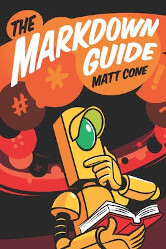 The Markdown markup language is one of the most popular plain-text formatting languages available.
The Markdown markup language is one of the most popular plain-text formatting languages available.
Learn the Markdown syntax with the book that’s been called “the best Markdown reference.” Designed for both novices and experts, The Markdown Guide is a comprehensive reference manual that has everything you need to get started and master the Markdown syntax.
This book is licensed under a Creative Commons Attribution-ShareAlike 4.0 International License.
2. bookdown: Authoring Books and Technical Documents with R Markdown by Yihui Xie
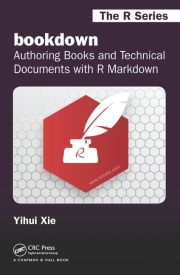 This short book introduces an R package, bookdown, to change your workflow of writing books. It should be technically easy to write a book, visually pleasant to view the book, fun to interact with the book, convenient to navigate through the book, straightforward for readers to contribute or leave feedback to the book author(s), and more importantly, authors should not always be distracted by typesetting details.
This short book introduces an R package, bookdown, to change your workflow of writing books. It should be technically easy to write a book, visually pleasant to view the book, fun to interact with the book, convenient to navigate through the book, straightforward for readers to contribute or leave feedback to the book author(s), and more importantly, authors should not always be distracted by typesetting details.
The online version of this book is licensed under the Creative Commons Attribution-NonCommercial-ShareAlike 4.0 International License. A hardcopy is available to purchase.
3. R Markdown The Definitive Guide by Yihui Xie, J. J. Allaire, Garrett Grolemund
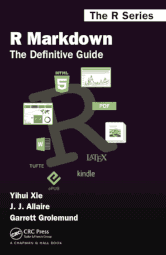 R Markdown: The Definitive Guide is an official book authored by the core R Markdown developers that provides a comprehensive and accurate reference to the R Markdown ecosystem.
R Markdown: The Definitive Guide is an official book authored by the core R Markdown developers that provides a comprehensive and accurate reference to the R Markdown ecosystem.
With R Markdown, you can easily create reproducible data analysis reports, presentations, dashboards, interactive applications, books, dissertations, websites, and journal articles, while enjoying the simplicity of Markdown and the great power of R and other languages.
The online version of this book is free to read here (thanks to Chapman & Hall/CRC), and licensed under the Creative Commons Attribution-NonCommercial-ShareAlike 4.0 International License.
4. blogdown: Creating Websites with R Markdown by Yihui Xie, Amber Thomas, Alison Presmanes Hill
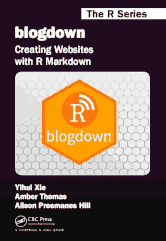
With blogdown, you can easily create websites and blogs straight from R Markdown documents. blogdown integrates R Markdown with static website generators, so that you can generate web pages dynamically.
Creating Websites with R Markdown provides a practical guide for creating websites using the blogdown package in R. In this book, the authors show you how to use dynamic R Markdown documents to build static websites featuring R code (or other programming languages) with automatically rendered output such as graphics, tables, analysis results, and HTML widgets.
The blogdown package is also suitable for technical writing with elements such as citations, footnotes, and LaTeX math.
5. Learn Markdown
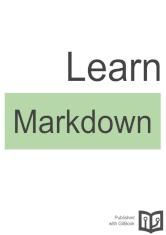
Learn Markdown is a 12 page PDF that offers a very gentle introduction to Markdown, a language that lets you write using an easy-to-read, easy-to-write plain text format, and optionally convert it to structurally valid XHTML (or HTML).
The book covers the basics of this language.
It looks at titles, links, images, code blocks and tables.
This book is written in Markdown.
All books in this series:
| Free Programming Books | |
|---|---|
| Ada | ALGOL-like programming language, extended from Pascal and other languages |
| Agda | Dependently typed functional language based on intuitionistic Type Theory |
| Arduino | Inexpensive, flexible, open source microcontroller platform |
| Assembly | As close to writing machine code without writing in pure hexadecimal |
| Awk | Versatile language designed for pattern scanning and processing language |
| Bash | Shell and command language; popular both as a shell and a scripting language |
| BASIC | Beginner’s All-purpose Symbolic Instruction Code |
| C | General-purpose, procedural, portable, high-level language |
| C++ | General-purpose, portable, free-form, multi-paradigm language |
| C# | Combines the power and flexibility of C++ with the simplicity of Visual Basic |
| Clojure | Dialect of the Lisp programming language |
| ClojureScript | Compiler for Clojure that targets JavaScript |
| COBOL | Common Business-Oriented Language |
| CoffeeScript | Transcompiles into JavaScript inspired by Ruby, Python and Haskell |
| Coq | Dependently typed language similar to Agda, Idris, F* and others |
| Crystal | General-purpose, concurrent, multi-paradigm, object-oriented language |
| CSS | CSS (Cascading Style Sheets) specifies a web page’s appearance |
| D | General-purpose systems programming language with a C-like syntax |
| Dart | Client-optimized language for fast apps on multiple platforms |
| Dylan | Multi-paradigm language supporting functional and object-oriented coding |
| ECMAScript | Best known as the language embedded in web browsers |
| Eiffel | Object-oriented language designed by Bertrand Meyer |
| Elixir | Relatively new functional language running on the Erlang virtual machine |
| Erlang | General-purpose, concurrent, declarative, functional language |
| F# | Uses functional, imperative, and object-oriented programming methods |
| Factor | Dynamic stack-based programming language |
| Forth | Imperative stack-based programming language |
| Fortran | The first high-level language, using the first compiler |
| Go | Compiled, statically typed programming language |
| Groovy | Powerful, optionally typed and dynamic language |
| Haskell | Standardized, general-purpose, polymorphically, statically typed language |
| HTML | HyperText Markup Language |
| Icon | Wide variety of features for processing and presenting symbolic data |
| J | Array programming language based primarily on APL |
| Java | General-purpose, concurrent, class-based, object-oriented, high-level language |
| JavaScript | Interpreted, prototype-based, scripting language |
| Julia | High-level, high-performance language for technical computing |
| Kotlin | More modern version of Java |
| LabVIEW | Designed to enable domain experts to build power systems quickly |
| LaTeX | Professional document preparation system and document markup language |
| Lisp | Unique features - excellent to study programming constructs |
| Logo | Dialect of Lisp that features interactivity, modularity, extensibility |
| Lua | Designed as an embeddable scripting language |
| Markdown | Plain text formatting syntax designed to be easy-to-read and easy-to-write |
| Objective-C | Object-oriented language that adds Smalltalk-style messaging to C |
| OCaml | The main implementation of the Caml language |
| Pascal | Imperative and procedural language designed in the late 1960s |
| Perl | High-level, general-purpose, interpreted, scripting, dynamic language |
| PHP | PHP has been at the helm of the web for many years |
| PostScript | Interpreted, stack-based and Turing complete language |
| Prolog | A general purpose, declarative, logic programming language |
| PureScript | Small strongly, statically typed language compiling to JavaScript |
| Python | General-purpose, structured, powerful language |
| QML | Hierarchical declarative language for user interface layout - JSON-like syntax |
| R | De facto standard among statisticians and data analysts |
| Racket | General-purpose, object-oriented, multi-paradigm, functional language |
| Raku | Member of the Perl family of programming languages |
| Ruby | General purpose, scripting, structured, flexible, fully object-oriented language |
| Rust | Ideal for systems, embedded, and other performance critical code |
| Scala | Modern, object-functional, multi-paradigm, Java-based language |
| Scheme | A general-purpose, functional language descended from Lisp and Algol |
| Scratch | Visual programming language designed for 8-16 year-old children |
| SQL | Access and manipulate data held in a relational database management system |
| Standard ML | General-purpose functional language characterized as "Lisp with types" |
| Swift | Powerful and intuitive general-purpose programming language |
| Tcl | Dynamic language based on concepts of Lisp, C, and Unix shells |
| TeX | Markup and programming language - create professional quality typeset text |
| TypeScript | Strict syntactical superset of JavaScript adding optional static typing |
| Vala | Object-oriented language, syntactically similar to C# |
| VHDL | Hardware description language used in electronic design automation |
| VimL | Powerful scripting language of the Vim editor |
| XML | Rules for defining semantic tags describing structure ad meaning |
